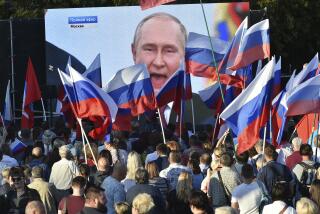Yeltsin’s Challenge: How Disruptive? : Chaos Is One Possibility If the Soviet Union Unravels
The Soviet Union is slated to get a new charter by the end of this year that will define the “union of sovereign states” President Gorbachev has promised in his vision of a recast Soviet federalism.
But events could overtake the effort to draft a power-sharing plan that aims at preventing national fragmentation, triggering potentially serious problems for the international community.
The Baltic states, though they may be compelled to defer reclaiming the independence snatched from them 50 years ago, have no intention of renouncing their goal. In the populous Ukraine, in Moldavia, in Transcaucasia, rising nationalist passions could ignite the bonfires of secessionism. And in the enormous Russian Republic itself, President Boris Yeltsin leads demands for sovereignty and control over the land’s abundant resources.
Though still contained, the centrifugal forces threatening the Soviet Union’s territorial integrity are gathering strength. No one expects an imminent breakup into separate and antagonistic states. But it’s also an open question whether the country is ready to set its foot firmly on the path toward orderly political evolution that Gorbachev envisages.
There seems to be no national consensus to preserve the Soviet state in its present form, and an effective center of command to mobilize such a consensus no longer exists. The Communist Party, long the one unifying element in the multinational, multilingual country, has suffered a near-total collapse of moral authority. The central government, meanwhile, is despised for its chronic economic mismanagement. The breakdown in institutional authority is matched by a decline in personal authority. Gorbachev, the reformer, remains a far more popular figure abroad than he is at home, where he is blamed for falling living standards, rising crime and the ineffectiveness of halfhearted economic reforms.
Into this vacuum has leapt Boris Yeltsin, suddenly the most prominent politician inside Russia.
Yeltsin, popularly elected and thus bearing a political legitimacy that Gorbachev lacks, is ready to challenge the national president on virtually every issue. Yeltsin speaks for a populist, nationalist mood that must be taken seriously. The Russia he now presides over covers three-fourths of the Soviet Union’s land mass, contains half the country’s population and produces most of its oil--which, Yeltsin complains, Russia has been forced to sell to other republics at far less than fair market prices.
Yeltsin and other Russian nationalists say things must change. They aren’t talking about separatism and independence--yet--but they are talking about a sovereignty that would give Russian laws precedence over Soviet laws, and that would leave the republic free to make treaties and fix its own terms of trade with other republics.
It’s one thing for Gorbachev to tighten the economic screws to force the Baltic states back into line. Russia is a far different matter--too big to be bullied, its president much too popular to be easily discredited.
Gorbachev talks about diffusing power under his new federal plan. But if the Russian Parliament has its way, the approach to power sharing will be radically reversed. It won’t be the central government that decides what powers to delegate to the republics; it will be the republics that will choose what responsibilities to grant to the once all-powerful center.
If that happens, the Soviet state that Lenin and Stalin created will in effect have ceased to exist.
More to Read
Sign up for Essential California
The most important California stories and recommendations in your inbox every morning.
You may occasionally receive promotional content from the Los Angeles Times.









